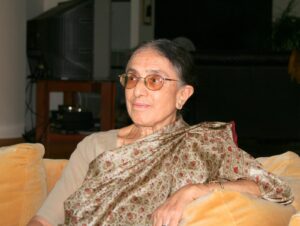
(This is an excerpt from my book on my mother, titled above, which has just been started by me)
Preface
Why does man go back in his life to elaborately remember something? It is because the evocation of some memories is blissful, even though they may be laced with pain. On the physical plane life is an incessant process of mind-body functioning, but on the mental plane it is a giant stage on which life is played out with great drama. Visiting one’s past is the continuation of the theater of life.
My mother was a very social personality, in which her role in her life, together with the role she played in the society she lived in, were the alpha and omega of her existence. She was not a philosopher; her existence was prescribed to her; she did not have much freewill. Honor and duty were her religion and discipline and conformance her mantras.
My mother has been a source of love to me, both when she was alive and when she is no more. Pure and unconditional love is a unique human phenomenon, which uplifts human existence to among the rarest states. I continue to be in touch with her even after sixteen years of her demise.
The following brief story of her life is not her biography, but a set of reflections on the passage of her soul as it passed through time, one of the inexorable references of human life.
(This is an excerpt from the first chapter of my book on my mother, which has just been started by me)
My mother was born in a large Kashmiri Pamdit family, Karihaloo’s. The name was a nick name, meaning bent-neck, whose origin will be explained a little later. Basically, their name was Kaul, but in practice they were called Kaul Karihaloo’s. There was a period in Kashmiri Pandit history when family nick names were quite prevalent. Most often they were based on the dark side of or the cruel jokes on the family.
Mother was born on November 19, 1920, the fourth child of Dama and Devmali Kaul Karihaloo. But her oldest sibling, a brother, passed away in a crib-death; perhaps, when he was one or two years old. So, she lived with an older brother, Kashi Nath; an older sister, Kamla; younger brothers, Radha Krishen and Makhan Lal; and the younger sister, Sarojni.
Karihaloo’s, at the time mother was born, comprised of five brothers and their families. Together with perhaps some widows and poor relatives – keeping some of them under the family roof was almost customary those days among Pandits; and a retinue of servants, permanent and temporary; the whole ensemble must have been as high as thirty people. It must not have been easy to manage it.
Kashmiri Pandits were a very sociable people at that time in their history. Relationships with kith and kin were the basic fabric of existence. It was the field which delineated the charge of proper living: right relationships and right hierarchy of leadership. It was also the arena where you won and lost your image, the raison d’etre of your existence.
The image of Karihaloo’s and the life they lived that has emerged from the fond recollections of its members, who have long departed, is that of a rich life, tapestried by the intensity of their relationships, the architecture of the family, the sheer joie de vivre they experienced that time. Love among the family members was the main axle of the engine of life.




